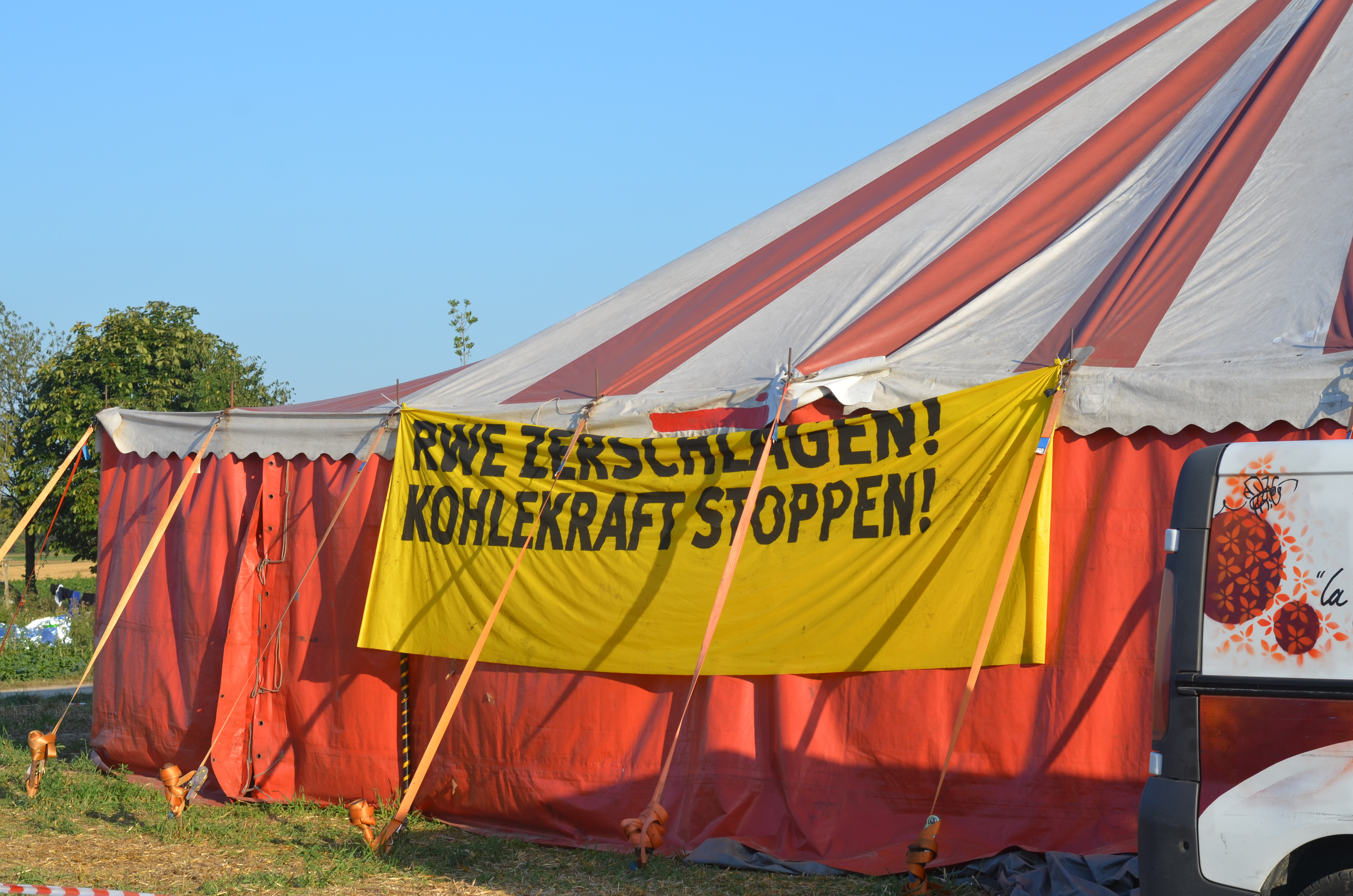By Oscar Krüger
By now, there are likely few who have not heard of Pope Francis's recent encyclical on the environment, “Laudato Si'”. And as many of the readers of this blog might already know, the Spanish and Italian versions contain what appears to be a direct endorsement of degrowth: the use of the term „decrecimiento“ (sp) and „decrescita“ (it), even if this is watered down to „decreased growth“ (en) and „Rezession“ (ger) in other translations. But whether or not „degrowth“ would make a better translation of the Pope's intended meaning, much more significant than a single word is the manner in which the letter as a whole points in direction of the territory constituted by the thinkers and activists of degrowth. The present text offers some brief reflections on how this is the case.
The encyclical Laudato Si' has been received with some fanfare around the world, and has been construed by the media as variously green, radical, or anti-capitalist. But, in contrast to what is frequently implied, it would be wrong to understand Francis's encyclical as a clear break with the Church's social teaching rather than (as he himself states) an addition to what is already there (see n. 15). This becomes increasingly clear if we go back to the origins of such teachings, where we find another encyclical: the Rerum novarum issued by Leo XIII in 1891. Where Francis's encyclical is prompted by the pressing crisis befalling the environment, Leo XIII's was prompted by the crisis befalling the urban working classes of his time. The fact that Francis now endeavours to bring the natural environment into the sphere of the Church's teaching in no way abandons the focus on the social environment which was the concern of Leo XIII. The environment that appears in Francis's encyclical is not detached from those working poor. Instead, it is an environment which can only be apprehended once we “realize that a true ecological approach always becomes a social approach; it must integrate questions of justice in debates on the environment, so as to hear both the cry of the earth and the cry of the poor“ (n. 49). And, rather than having us direct our hopes towards another technical miracle waiting just around the next corner, an answer to these cries is taken to require a “bold cultural revolution“ (n. 114). Scepticism towards the gospel of growth can be gleaned already in speeches by Benedict XVI and, in light of the enduring influence of Catholic writers on degrowth such as E.F Schumacher and Ivan Illich, the resonance between both understandings of such a need for revolution is not entirely surprising. So let's look closer at how the encyclical in particular construes this need.
The paradigm the cultural revolution needs to overthrow is clearly identified: “the deepest roots of our present failures [...] have to do with the direction, goals, meaning and social implications of technological and economic growth.“ (n. 109). And although the encyclical proposes a variety of measures that individuals can practice in their daily lives, it is just as clear that a form of politics is required in order to truly unearth these roots (e.g. section IV). This saves the encyclical from falling into either of two common traps: First, it avoids making individual (consumer) behaviour either the primary culprit or the privileged site for intervention. Although greed and short-sightedness are condemned over and over again, such behaviour is nonetheless understood as systemically engendered by deeper structures, which would then reasonably be where an intervention needs to put its real focus (e.g. n. 203). Second, it likewise avoids making technology either culprit or hope in any simple way; science and technology are said to become problems only insofar as they are „taken up […] according to an undifferentiated and one-dimensional paradigm“ (n. 106). Thus avoiding two traps of depoliticizing productivism within a paradigm where “our politics are subject to technology and finance“ (n. 54), Francis calls the central task of the required revolution “a matter of redefining our notion of progress“, since “[a] technological and economic development which does not leave in its wake a better world and an integrally higher quality of life cannot be considered progress.“ (n. 194).
How about such “quality of life”? A modest and easily overlooked paragraph discussing an aspect of church tradition gives clues to how this is conceived. The discussion is on the topic of the ordained rest on the week's seventh day. According to Francis, this rest is not to be understood as an inactive pause in a person's engagement in producing the valuable objects of human life, but rather as the activity which restores to the entire week that “very thing which is most important about work: its meaning.“ (n. 237). And thus the tautologous “development” of merely productive power is made subject to some qualitatively different standards. Whatever one would imagine these other standards to be, Francis maintains that a Christian approach would hold that “less is more“ (n. 222). And this is a “more“ which is literally so, since the “less“ of participation in consumerist lifestyles is taken to liberate humans so to let them partake in the self-transcendence that is deemed proper to their being: “Such sobriety, when lived freely and consciously, is liberating. It is not a lesser life or one lived with less intensity. On the contrary, it is a way of living life to the full. […] Happiness means knowing how to limit some needs which only diminish us, and being open to the many different possibilities which life can offer.“ (n. 223).
This adds up to the notion that “we need to grow in the conviction that a decrease in the pace of production and consumption can at times give rise to another form of progress and development.“ (n. 191). And that leaves the question of the proper translation to “decreased growth“ in note 193 rather superfluous: Francis has already brought his readers to a conceptual space where the positions taken up by partisans of degrowth are no longer fringe lunacy, but sources to listen to with utmost seriousness. And to a large extent, these positions even come to meet readers at the exact point where the encyclical leaves them. Much can be learnt, for instance, by going forth to read what somebody like Arturo Escobar tells us about the problems pertaining to current models of progress and development. And when the question arises how to build a politics beyond the growth imaginary in a manner that does not abandon the sense for how “inseparable the bond is between concern for nature, justice for the poor, commitment to society, and interior peace” (n. 10), then one will find that these elements lead straight on to the strands that weave together the current degrowth debate. Taking its sources as summarized by Muraca and Demaria et al., inquirers departing from the encyclical and arriving to degrowth will find:
In all, as the subtitle of the encyclical alleges, Francis's message is a call to redirect politics and the economy towards a renewed “care for our common home”. And the path the encyclical points to is one of great possible convergence with that of the many heterogeneous efforts shaping the already existing path of degrowth.
It might be worth noting that, although many media outlets construe the encyclical as heralding the Church's belated arrival to the modern world, the exact opposite is in fact the case. If anything, it rather presents a renewed confrontation with that world in the form of a “dark reflection on the systemic evils of modernity“ which is replete with “anti-scientific, anti-technological, and anti-progressive sentiments”. So what should the encyclical's readers do, if nevertheless remaining committed to following up on its sentiments? If one accepts that its message is in fact “reactionary”, there is still much to learn from a stream of thought inspired by both reactionary Catholics such as Illich, as well as “reactionary Utopians” such as Gandhi, and the way these thinkers's lessons have been cultivated within the growing discourse on degrowth. Moreover, these readers could then do worse than seeking inspiration in initiatives that arose in the wake of Leo XIII's original 1891 encyclical – practical ones such as the Mondragon corporation in the Basque lands, as well as theoretical ones such as in the writings of a G. K. Chesterton. Simultaneously, they should ask to what extent historical experience, as well as our current situation, teach us that further radicalization of such efforts is required if their original spirit is to be carried forth. What would it really take to break the structurally induced need for profit and incessant growth which undermines the socio-ecological conviviality which the encyclical envisions?
But also for those already part of this discussion – including many who harbour few sympathies with Catholicism – the encyclical presents challenges to be confronted. This is because the way it weaves together social and natural ecology around a substantive vision of the Good life does so while recognizing the possibility of such unity only within a practice that is guided by ceaseless wonder at everything that is (e.g. n. 11). Only within such wonder is the infinite significance of each being revealed, in a manner that eludes the paradigm of quantity and usefulness more profoundly than “scientific” demonstrations of the self-destructive trajectory of growth can ever do. For those of us not content with that ontologization of politics that supposes power to be the basic principle of existence, it is a challenge to undo a certain marginalization of such wonder. And here, one could find less worthy starting points than that of partaking in the joy infusing the Canticle of the Creatures, from which Francis's encyclical takes its name: Laudato Si'!
On the Need for Collaboration Between Social Movements and Activisms By Lucie Bardos Not that long ago, I left North America and arrived fresh and starry-eyed in Lund, Sweden, ready to begin my master’s degree in a program entitled Culture, Power and Sustainability. In my second year, I decided to write my thesis about the Transition Town movement, a social movement out of Great Britain born ...

Das Projekt- und Aktionsnetzwerk living utopia lädt am 5. November 2016 zur Utopie-Ökonomie-Konferenz (UTOPIKON) nach Berlin ein. Geplant sind 300 Teilnehmer*innen, fünf Keynotes, zehn Workshops und ein inspirierendes Rahmenprogramm. Als Referent*innen haben bisher unter anderem Silke Helfrich, Friederike Habermann, Niko Paech und Gerrit von Jorck zugesagt. Die Idee: Die UTOPIKON möchte zum ...

Aus Protest gegen den unverminderten Braunkohleabbau, der weiterhin Wälder und Dörfer verschlingt, findet dieses Jahr zum fünften Mal das Klimacamp Rheinland statt. Organisiert von einem Bündnis aus BUNDjugend NRW, ausgeCOhlt und zahlreichen Unterstützerorganisationen wird das diesjährige Camp wie bereits in 2010 am Tagebau Garzweiler veranstaltet. Während sich Anwohner_innen und lokale Bürge...